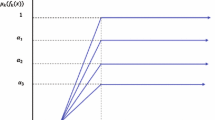Abstract
Over the past few decades, many-objective evolutionary algorithms have been proposed and presented as competitive compared with state-of-the-art algorithms. The evaluation of these algorithms involves many performance metrics, considered as a multiple criteria decision-making problem. In order to fairly and faithfully evaluate these algorithms, a novel evaluation approach based on hesitant fuzzy linguistic term set and majority operator is proposed. Hesitant fuzzy linguistic term set is used to express the opinions of experts, and majority operator is used to aggregate the opinions of experts. The framework for evaluation is presented, in which comprehensive performance metrics are proposed. An experimental study is designed to validate the proposed method. The experimental results indicate that the proposed approach is accurate and effective; the ability of algorithms to solve many-objective problems relies on both algorithms and the features of problems. Finally, the proposed method is used to evaluate the meteorological disaster that occurred in China in 2008.








Similar content being viewed by others
References
Beg, I., Rashid, T.: TOPSIS for hesitant fuzzy linguistic term sets. Int. J. Intell. Syst. 28(12), 1162–1171 (2013)
Cheng, R., Jin, Y.C., Olhofer, M., Sendhoff, B.: A reference vector guided evolutionary algorithm for many-objective optimization. IEEE Trans. Evol. Comput. 20(5), 773–791 (2016)
Chen, S.M., Hong, J.A.: Multicriteria linguistic decision making based on hesitant fuzzy linguistic term sets and the aggregation of fuzzy sets. Inf. Sci. 286, 63–74 (2014)
Coello, C.A.C., Lamont, G.B., Van Veldhuizen, D.A.: Evolutionary Algorithms for Solving Multi-Objective Problems. Springer, New York (2007)
Dai, C., Wang, Y.P.: A new decomposition based evolutionary algorithm with uniform designs for many-objective optimization. Appl. Soft Comput. 30, 238–248 (2015)
Deb, K., Jain, H.: An evolutionary many-objective optimization algorithm using reference-point-based nondominated sorting approach, Part I: solving problems with box constraints. IEEE Trans. Evol. Comput. 18(4), 577–601 (2014)
Deb, K., Jain, S.: Running performance metrics for evolutionary multi-objective optimization. KanGAL Report No. 2002004. Kanpur Genetic Algorithms Laboratory, Indian Institute of Technology, Kanpur, India (2002)
Deb, K., Pratap, A., Agarwal, S., Meyarivan, T.: A fast elitist multi-objective genetic algorithm: NSGA-II. IEEE Trans. Evol. Comput. 6(2), 182–197 (2002)
Deb, K., Thiele, L., Laumanns, M., Zitzler, E.: Scalable test problems for evolutionary multi-objective optimization. Adv. Inf. Knowl. Process. 105–145 (2005)
Farhadinia, B., Herrera-Viedma, E.: Entropy measures for hesitant fuzzy linguistic term sets using the concept of interval-transformed hesitant fuzzy elements. Int. J. Fuzzy Syst. (2017). https://doi.org/10.1007/s40815-017-0379-x
Gou, X.J., Xu, Z.S.: Novel basic operational laws for linguistic terms, hesitant fuzzy linguistic term sets and probabilistic linguistic term sets. Inf. Sci. 372, 407–427 (2016)
He, Z.N., Yen, G.G.: Comparison of many-objective evolutionary algorithms using performance metrics ensemble. Adv. Eng. Softw. 76, 1–8 (2014)
Hui, L., Qingfu, Z.: Multiobjective optimization problems with complicated Pareto sets, MOEA/D and NSGA-II. IEEE Trans. Evol. Comput. 13(2), 284–302 (2009)
Kahraman, C., Onar, S.Ç., Öztayşi, B.: B2C marketplace prioritization using hesitant fuzzy linguistic AHP. Int. J. Fuzzy Syst. (2017). https://doi.org/10.1007/s40815-017-0429-4
Lee, L.W., Chen, S.M.: Fuzzy decision making based on likelihood-based comparison relations of hesitant fuzzy linguistic term sets and hesitant fuzzy linguistic operators. Inf. Sci. 294, 513–529 (2015)
Liang, R.X., Wang, J.Q., Zhang, H.Y.: Projection-based promethee methods based on hesitant fuzzy linguistic term sets. Int. J. Fuzzy Syst. (2017). https://doi.org/10.1007/s40815-017-0418-7
Liao, H.C., Gou, X.J., Xu, Z.S.: A survey of decision making theory and methodologies of hesitant fuzzy linguistic term set. Syst. Eng. Theory Pract. 37(1), 35–48 (2017)
Liao, H.C., Xu, Z.S., Herrera-Viedma, E., Herrera, F.: Hesitant fuzzy linguistic term set and its application in decision making: a state-of-the-art survey. Int. J. Fuzzy Syst. (2017). https://doi.org/10.1007/s40815-017-0432-9
Liao, H.C., Xu, Z.S., Zeng, X.J.: Distance and similarity measures for hesitant fuzzy linguistic term sets and their application in multi-criteria decision making. Inf. Sci. 271, 125–142 (2014)
Liao, H.C., Xu, Z.S., Zeng, X.J.: Hesitant fuzzy linguistic VIKOR method and its application in qualitative multiple criteria decision making. IEEE Trans. Fuzzy Syst. 23(5), 1343–1355 (2015)
Liao, H.C., Xu, Z.S., Zeng, X.J., Merigó, J.M.: Qualitative decision making with correlation coefficients of hesitant fuzzy linguistic term sets. Knowl. Based Syst. 76, 127–138 (2015)
Li, P., Wei, C.P.: A case-based reasoning decision-making model for hesitant fuzzy linguistic information. Int. J. Fuzzy Syst. (2017). https://doi.org/10.1007/s40815-017-0391-1
Liu, H.C., Rodríguez, R.M.: A fuzzy envelope for hesitant fuzzy linguistic term set and its application to multicriteria decision making. Inf. Sci. 258, 220–238 (2014)
Liu, Y.P., Gong, D.W., Sun, X.Y., Zhang, Y.: Many-objective evolutionary optimization based on reference points. Appl. Soft Comput. 50, 344–355 (2017)
Peláez, J.I., Doña, J.M.: Majority additive-ordered weighting averaging: a new neat ordered weighting averaging operator based on the majority process. Int. J. Intell. Syst. 18(4), 469–481 (2003)
Rashid, T., Faizi, S., Xu, Z.S., Zafar, S.: Electre-based outranking method for multi-criteria decision making using hesitant intuitionistic fuzzy linguistic term sets. Int. J. Fuzzy Syst. (2017). https://doi.org/10.1007/s40815-017-0297-y
Rodriguez, R.M., Martinez, L., Herrera, F.: Hesitant fuzzy linguistic term sets for decision making. IEEE Trans. Fuzzy Syst. 20(1), 109–119 (2012)
Sun, R.X., Hu, J.H., Zhou, J.D., Chen, X.H.: A hesitant fuzzy linguistic projection-based mabac method for patients’ prioritization. Int. J. Fuzzy Syst. (2017). https://doi.org/10.1007/s40815-017-0345-7
Wang, H., Xu, Z.S.: Total orders of extended hesitant fuzzy linguistic term sets: definitions, generations and applications. Knowl. Based Syst. 107, 142–154 (2016)
Wang, J., Wang, J.Q., Zhang, H.Y., Chen, X.H.: Multi-criteria decision-making based on hesitant fuzzy linguistic term sets: an outranking approach. Knowl. Based Syst. 86, 224–236 (2015)
Yang, S., Li, M., Liu, X., Zheng, J.: A grid-based evolutionary algorithm for many-objective optimization. IEEE Trans. Evol. Comput. 17(5), 721–736 (2013)
Acknowledgements
This study was funded by China Natural Science Foundation (Grant Nos. 71503134, 91546117, 71373131), Key Project of National Social and Scientific Fund Program (16ZDA047) and philosophy and Social Sciences in Universities of Jiangsu (Grant No. 2016SJB630016).
Author information
Authors and Affiliations
Corresponding author
Rights and permissions
About this article
Cite this article
Yu, X., Lu, Y. Evaluation of Many-Objective Evolutionary Algorithms by Hesitant Fuzzy Linguistic Term Set and Majority Operator. Int. J. Fuzzy Syst. 20, 2043–2056 (2018). https://doi.org/10.1007/s40815-018-0488-1
Received:
Revised:
Accepted:
Published:
Issue Date:
DOI: https://doi.org/10.1007/s40815-018-0488-1




